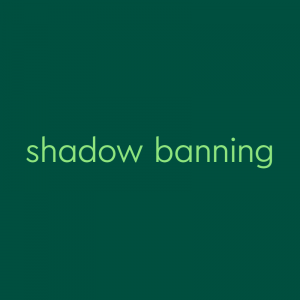shadow banning
or shadowbanning [ shad-oh ban-ing ]
What does shadow banning mean?
Shadow banning is a practice used in online moderation that consists of preventing a user’s content from being seen by others—either partially or totally—without the user being notified or aware of it. This is typically done as a consequence of violating a platform’s rules.
The term shadow ban can be used as a verb meaning to ban a user in such a way and as a noun referring to such a ban. The adjective form is shadow banned. Similar terms such as ghost ban, stealth ban, and comment ban are sometimes used synonymously with shadow ban.
In contrast, traditional bans typically result in the banned user not being able to access their account at all.
Shadow banning instead allows the user to continue to use the site seemingly as normal. The user may not initially realize that they have been shadow banned until they notice a lack of interactions with the content that they post (because it is being hidden completely or displayed to fewer users).
The term shadow banning has been applied to moderation practices used by many popular online platforms, such as Reddit, Twitter, and Facebook. Some websites explicitly use the term shadow banning in their public rules.
The practice is often criticized due to its lack of transparency or for other reasons. Some critics accuse websites of using shadow banning to censor particular opinions or viewpoints.
Example: The site is known for shadow banning users that violate its rules, which it claims is easier and more effective than outright banning them.
Where does shadow banning come from?

Moderation practices similar to or effectively the same as the one that became known as shadow banning can be traced back to the early days of online forums, message boards, chat rooms, and other platforms.
Rich Kyanka, the creator of the website Something Awful, claimed that moderators of the site coined the term shadow ban in 2001 to refer to a specific moderation practice used to punish trolls.
Use of the term became more widespread in the late 2010s, when some websites, such as Reddit, began using the term and practice.
The term shadow banning gained more mainstream awareness in 2018 after President Donald Trump claimed in a tweet that Twitter was using shadow banning to censor conservative opinions, which Twitter denied.
The word ban is commonly used as both a noun and verb in the context of online moderation, typically used in situations in which a user’s access to a platform is permanently blocked. The word shadow is used in a similar way in other terms that imply a sense of stealth or secrecy.
Examples of shadow banning
Looks like I was just randomly (or not) shadow banned from Reddit.
The Federal Election Commission unanimously rejected a complaint by Republican Rep. Matt Gaetz of Florida against the social media giant Twitter that alleged the company violated campaign finance regulations by "shadow-banning" the congressman in 2018.
Who uses shadow banning?
Several popular platforms use moderation practices considered or explicitly called shadow banning. The term shadow ban is commonly used as both a verb and a noun.
https://twitter.com/iamzackknight/status/1397548926996258824
Twitter would never shadow ban people’s pages or posts. IG can learn a thing or two from Twitter.
— Amra Olević Reyes (@amrezy) August 4, 2020
I wish YouTube would do something about the porn bots that just steal real comments. I delete and shadow ban like 30 bots a day. It's really annoying.
— Mithzan (@Mithzan) December 8, 2021
NOTE
This is not meant to be a formal definition of shadow banning like most terms we define on Dictionary.com, but is rather an informal word summary that hopefully touches upon the key aspects of the meaning and usage of shadow banning that will help our users expand their word mastery.